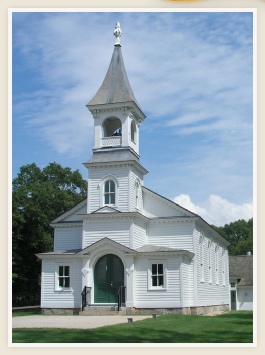



Links | . Privacy Policy

Revelation Revisited © 2013

"In the beginning".
So begins the divine revelation of origins recorded in the book of Genesis. For most of the last four thousand years this narrative has been accepted as the factual account of the beginning of the human story. The exact degree to which this narrative is literal has been questioned and debated, but the narrative itself has been accepted as the starting point for those discussions. Any reading of the New Testament shows that Jesus Himself, and those who believed in him, accepted the Genesis story as a bedrock truth - both of the creation of man and the subsequent fall of man, which set into motion the entire salvation story of God's redemption and restoration of man.
The Book of Revelation is the natural counterpoint to the Book of Genesis. They are bookends that bracket the entire history of man's decent into ungodliness. In Genesis, the fall is documented. In Revelation, the restoration is made complete. The Genesis story begins in a garden. Revelation shows the new earth restored to Eden's perfection. Genesis shows the origin of sickness, sorrow, deception and death. Revelation assures us that those enemies will be eradicated - to be replaced with health, happiness, holiness and eternal life. In Genesis we find the Tree of the Knowledge of Good and Evil. In Revelation we are given the Tree of Life.
Both books are given by divine revelation, to show us things not otherwise visible to us at this time. Together they give us essential reference points to show us that we are not just randomly produced organisms existing accidentally at this point in time in the long story of the universe; but are the beloved workmanship of the God of the Universe, and that we are in an ongoing timeline - connected to the past and the future.
Spanning this entire arc of humanity's story like a bridge of grace, is the Sabbath. Like man, the Sabbath was breathed into existence by God as a great Benediction of Peace to the human family - a seal of the perfection of the Creation, and an open invitation for mankind to dwell in the presence of God. The Sabbath was proof that creation was not just about physical matter, but was an expression of God's desire to be with man - to have an intimate, loving, on-going friendship with us.
Through the long, dark centuries of our fallen history, the purpose of God for mankind has not changed. Often the prophets recorded God's desire, "I will be your God, and you will be my people." Through the grace and activity of Jesus - "God with us" - that purpose will finally be realized. The high point of John's revelation is the pronouncement, "Behold, the tabernacle of God is among men, and He will dwell among them, and they shall be His people, and God Himself will be among them, and He will wipe away
The Sabbath Bridge

In the Fourth Commandment (above) God commands us to keep the Sabbath Holy because He - the creator - made it holy.
But that is not the only reason given. In Deuteronomy 5 the Israelites were told to keep the Sabbath holy because God had brought them out of slavery “by a mighty hand, and by an outstretched arm.” The Sabbath was to be a sign that God had saved them!
Keeping the Sabbath is not a means of meriting Salvation. Far from it! Instead, it acknowledges that God has done for us what we could not do: “You shall surely observe My sabbaths; for this is a sign between Me and you throughout your generations, that you may know that I am the LORD who sanctifies you.”
Our Mark of Redemption
God Reminds Us...

Remember the Sabbath day, to keep it holy. Six days you shall labor and do all your work, but the seventh day is a Sabbath of the LORD your God; in it you shall not do any work, you or your son or your daughter, your male or your female servant or your cattle or your sojourner who stays with you. For in six days the LORD made the heavens and the earth, the sea and all that is in them, and rested on the seventh day; therefore the LORD blessed the Sabbath day and made it holy.


every tear from their eyes; and there will no longer be any death; there will no longer be any mourning, or crying, or pain; the first things have passed away."
Little wonder then that the prophet Isaiah notes that in that world of restored perfection, "from Sabbath to Sabbath, all mankind will come to bow down before me, says the Lord." The Sabbath is God's eternal mark of his desire to be with us, and to be our God.
Six for Man, One for God
The weekly cycle established by God at creation has persisted throughout all of human history, and in every race and culture. In laying out His expectation of mankind, God stated that man should work for six days, and that the seventh should be set apart for God. On that Sabbath day, man's focus was to be shifted from his work to God's work for humanity. While resting from our labors, we contemplate the work of God on our behalf, the humility of Jesus in coming to this earth to be our brother and our self-sacrificing redeemer, and His work in heaven as He administers his grace on our behalf as our great High Priest.
This Sabbath cycle - six focused on man, one focused on the work of God - is indelibly imprinted on the great prophecies of Revelation. The stories of the Seals, the Trumpets and the Plagues each contain seven elements. As the first six occur, the entire focus is earth-bound, as we see the events play out in our environment and in our societies. With the seventh, however, the focus changes to heaven - and each time we see or hear something relating to the work of Jesus as man's great High Priest. Jesus - the Lord of the Sabbath - is the focus of each of these "seventh" events.
Sabbath Worship
In the great drama that unfolds in Revelation, the central struggle is one of Worship, as two powerful forces present themselves as the rightful centers of worship. One is the Dragon/Sea Beast entity, the other is Jesus. Each claims to be the rightful recipient of the worship of humanity. The Sea Beast invokes the power of the state to force "all men" to worship him and to receive his mark of ownership. Jesus, through the spirit-driven witnesses, and through the messages of the Three Angels warns against the worship of the Beast; and instead calls for all to worship him as the Creator of the earth.
As any student of the Bible knows, there is only one of the Ten Commandments given by God that speaks about worshiping the Creator, and that commandment clearly states that such worship is marked by remembering to keep the Sabbath holy. By this we can derive that the conflicting calls to worship will be marked by either the adherence to - or the violation of - the holiness of the Sabbath.